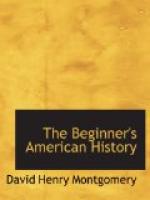Providence was the first settlement made in America which set its doors wide open to every one who wished to come and live there. Not only all Christians, but Jews, and even men who went to no church whatever, could go there and be at peace. This great and good work was done by Roger Williams. Providence grew in time to be the chief city in the state of Rhode Island. When the Revolution began, every man and boy in the state, from sixteen to sixty, stood ready to fight for liberty.
[Footnote 6: Seekonk (See’konk).]
[Footnote 7: “What Cheer Rock” is on the east side of the city of Providence.]
86. Summary.—Roger Williams, a young minister of Salem, Massachusetts, declared that the Indians, and not the king of England, owned the land in America. The governor of Massachusetts was afraid that if Mr. Williams kept on saying these things the king would hear of it and would take away the land held by the people of Boston and the other settlements. He therefore sent a constable to arrest the young minister and put him on board a ship going back to England. When Mr. Williams knew this, he fled to the Indian chief, Massasoit. In 1636 Roger Williams began building Providence. Providence was the first settlement in America which offered a home to all men without asking them anything whatever about their religious belief.
Who was Roger Williams? What is said about him and the Indians? Who did Mr. Williams think first owned the land in America? How did many of the people of Massachusetts feel about Mr. Williams? What did the chief men of Boston do? What did Mr. Williams do? Describe his journey to Mount Hope. What did Massasoit do for Mr. Williams? What did Mr. Williams do at Seekonk? What happened after that? Why did he name the settlement Providence? What is said of Providence? What about the Revolution?
KING PHILIP
(Time of the Indian War, 1675-1676).
87. Death of Massasoit; Wamsutta[1] and Philip; Wamsutta’s sudden death.—When the Indian chief Massasoit[2] died, the people of Plymouth lost one of their best friends. Massasoit left two sons, one named Wamsutta, who became chief in his father’s place, and the other called Philip. They both lived near Mount Hope, in Rhode Island.
The governor of Plymouth heard that Wamsutta was stirring up the Indians to make war on the whites, and he sent for the Indian chief to come to him and give an account of himself. Wamsutta went, but on his way back he suddenly fell sick, and soon after he reached home he died. His young wife was a woman who was thought a great deal of by her tribe, and she told them that she felt sure the white people had poisoned her husband in order to get rid of him. This was not true, but the Indians believed it.
[Footnote 1: Wamsutta (Wam-sut’ta).]
[Footnote 2: Massasoit: see paragraph 68.]




